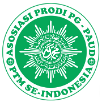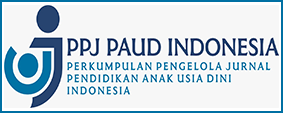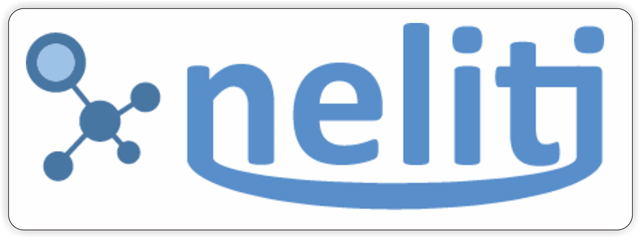Digitalization of Play Activities and Games: Artificial Intelligence in Early Childhood Education
(1) Institut Al Azhar Menganti Gresik, Indonesia
(2) Universitas Islam Negeri Antasari Banjarmasin, Indonesia
(3) Universitas PGRI Ronggolawe Tuban, Indonesia
(*) Corresponding Author
DOI: https://doi.org/10.26858/tematik.v10i1.62195
Abstract
This research study discusses the integration of artificial intelligence (AI) in Early Childhood Education (PAUD) units to improve play and game activities for children as well as innovation in implementing AI-based learning. AI technology has very good prospects and potential in changing teaching and learning activities in educational units with its ability to think and learn like humans, understand human feelings, find solutions in complex decision making, and so on. However, this is sometimes not in line with the application of AI in early childhood education units which are still in their early stages, especially in developing countries like Indonesia. The method used in this research is qualitative research, the data collection technique is from various journal articles about the benefits and impact of AI on early childhood play and play activities. With the support of AI, PAUD units can improve the results of their teaching and learning activities by facilitating more diverse play experiences, increasing operational efficiency, monitoring children's play and play results in real time. Although progress in the application of AI has been seen, there appear to be challenges and shortcomings, including limited AI research in fields outside of STEAM (Science, Technology, Engineering, Arts, and Mathematics), the lack of AI theories and models in play and gaming activities, and resistance in adopting AI in a child's play activities. It is important for PAUD units to integrate AI more optimally in the process of playing and playing activities for children, as well as providing training to educators, education staff and PAUD students to optimize the education system in the future
Keywords
References
Aoun, J. E. (2017). Robot Proof : Higher Education in the Age of Artificial Intelligence. MIT.
Arpaci, I. (2019). A Hybrid Modeling Approach for Predicting the Educational Use of Mobile Cloud Computing Services in Higher Education. Computers in Human Behavior. 90.
Bozkurt, A., Karadeniz, A. Baneres, D. Guerrero Roldan, A. E., & Rodriguez, M. e. (2021). Artificial Intelligence and Reflections from Educational Landscape: A Review of al studies in half a century. Sustaunability (Switzerland), 13(2), 1˗16. https://doi.org/10.3390/su13020800.
Dias, S. B., Hadjileontiadis, L. J., & Diniz, J. A. (2015). Fuzzy Cognitive Mapping of LMS User Qualityof Interaction Within Higher Education Blended Learning Enviroment. Expert System with Applications, 42, 7399 – 7423. https://doi.org/10.1016/j.eswa.2015.05.048.
Hutson,J., Jeevanjee,T., Graaf, V. V., Lively, J., Weber, J.,Weir, G.,Arnone, K., Carnes, G., Visevich, K., Plate, D., Leary, M., & Edele, S. (2022). Artificial Intelligence and the Disruption of Higher Education: Strategies for Integrations Across Disciplines. Creative Education, 13.3953 – 3980. https://doi.org/10.4236/ce.2022.1312253.
Kelly, S. (2021). ERIC – ED612436 – Understanding the impact of artificial intelligence on skils development. Education 2030, UNESCOUNEVOC International Centre for Technical and Vocational Education and Training, 2021.
Kose, U. (2018). An Augmented – Reality – Based Intelligent Mobile Application for Open Computer Education. In Virtual and Augmented Reality: Concepts, Methodologies, Tools, and Applications (pp. 324 – 344). IGI Global.
Miles, M. B. (2014). dan A. Michael Huberman, dan Johny Saldana. Qualitative Data Analysis.
Moha, I. (2019). Resume Ragam Peneletian Kualitatif.
Novitasari, Y., & Fauziddin, M. (2022). Analisis Literasi Digital Tenaga Pendidik Pada Pendidikan Anak Usia Dini. Jurnal Obsesi: Jurnal Pendidikan Anak Usia Dini, 6 (4), 3570 – 3577. https://doi.org/10.31004/obsesi.v6i4.2333.
Nurwahidah, I. (2020). Kemampuan Keterampilan Dasar Mengajar Mahasiswa Calon guru IPA Program Studi Pendidikan IPA. EduTeach: Jurnal Edukasi dan Teknologi Pembelajaran, 1 (2), 22 – 33. https://doi.org/10.37859/eduteach.v1i2.1957.
Senel, S., & Can, S. H. (2021). Remote Assessment in Higher Education during Covid22 – 19 Pandemic. International Journal of Assessments Tools in Education, 8(2), 18122 – 199. https://doi.org/10.21449/ijate.820140.
Slimi Z. (2021). The Impact of Al Implementation in Higher Education on educational proses future: A systematic review. Research Squae.Preprint.
Sugiyono, P. D. (2019). Metode Penelitian Pendidikan (Kuantitatif, Kualitatif, Kombinasi, R & D dan Penelitian Pendidikan). Metode Penelitian Pendidikan.
Tabi’in, A. (2020). Pola Asuh Demokratis Sebagai Upaya Menumbuhkan Kemandirian Anak di Panti Asuhan Dewi Aminah. Kindergarten: Journal of Islamic Early Childhood Education, 3 (1), 30 – 43. http://dx.doi.org/10.24014/kjiece.v3i1.9581.
Tulungen, E. E., Saerang, D. P., & Maramis, J. B. (2022). Transformasi Digital: Peran Kepemimpinan Digital. Jurnal EMBA: Jurnal Riset Ekonomi, Manajemen, Bisnis dan Akuntansi, 10 (2). https://doi.org/10.35794/emba.v10i2.41399.
Yu, Z. (2020). Visualizing Artificial Intelligence Used in Education over two decades. Journal of information technology Research (JITR), 13, 32 – 46. http://dx.doi.org/10.4018/JITR.2020100103.
Zagoto, M. M., Yarni, N., & Dakhi, O. (2019). Perbedaan Individu Dari Gaya Belajarnya Serta Implikasinya Dalam Pembelajaran. Jurnal Review Pendidikan dan Pengajaran (JRPP), 2 (2), 259˗ 265. https://doi.org/10.31004/jrpp.v2i2.481.
Article Metrics
Abstract view : 0 times |Refbacks
- There are currently no refbacks.
Copyright (c) 2024 Umi Masturoh; Ika Irayana; Firdausi Nuzula Adriliyana

This work is licensed under a Creative Commons Attribution-NonCommercial 4.0 International License.
Published by:
Program Studi Pendidikan Guru Pendidikan Anak Usia Dini, Fakultas Ilmu Pendidikan, Universitas Negeri Makassar
Kerjasama:
Support by:
Email: [email protected]
p-ISSN: 2476 - 9363
e-ISSN: 2723 - 7613

TEMATIK: Jurnal Pemikiran dan Penelitian Pendidikan Anak Usia Dini is licensed under a Creative Commons Attribution-NonCommercial 4.0 International License.
View My Stats


























